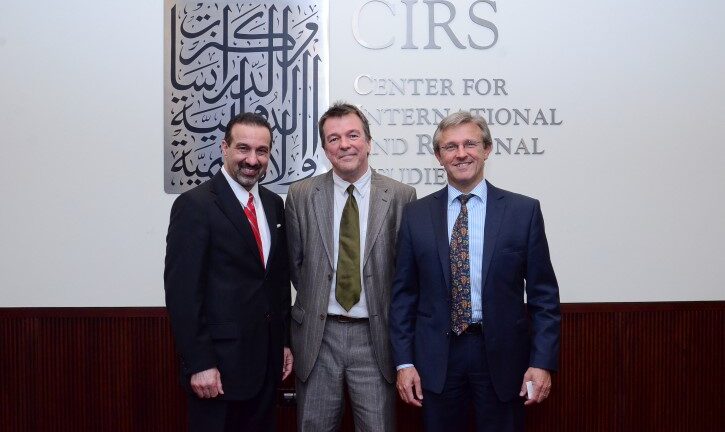Dialogue Series, Regional Studies
Richard Schofield on Britain Territorializing when Decolonizing the Gulf

Richard Schofield, an expert on the study of historical territorial disputes, delivered a CIRS Monthly Dialogue lecture on “Territorializing when Decolonizing: Britain Tries to Square its Circles in the Gulf, 1968-1971” on February 5, 2013. Schofield, who is Convenor of the Master’s programme in Geopolitics, Territory, and Security at King’s College in London, examined the period of the late 1960s and early 1970s when Britain announced its plans to leave the Gulf and end the regional Pax Britannica. During this time, there were several territorial issues and ongoing disputes that Britain needed to confront before its departure. “In the late 1960s, Britain was faced with a whole set of territorial issues between protected states, and between protected states and their neighbors,” Schofield said.
By examining recently released British foreign office documents, Schofield highlighted a set of disputes that were ongoing in the 1960s, including northern Gulf worries that continued on from the 1930s posed by Kuwait and its boundary dispute with Iraq, and, in particular, the intersection of boundaries and territorial claims between Abu Dhabi, Saudi Arabia, and Qatar in relation to the access corridor of Khor Al-Udaid.
Before its departure, Britain actively encouraged Gulf states into increased cooperation with each other and attempted to contribute towards a future grouping of Arab states on the western side of the Gulf in what was termed “Gulfery.” In order to achieve some movement on these territorial issues, the United States proposed solving several disputes simultaneously as a package of disputes. This included proposing to the Shah that Iran drop its claim to Bahrain, that Britain help Iran gain ownership of islands in the lower Gulf, and that a maritime boundary agreement be signed between Saudi Arabia and Iran allowing oil companies in to develop the area. “One of the things that was really troubling the States around this time was the failure of Saudi Arabia and Iran to finalize a boundary agreement so that they could open up the hydrocarbon reserves of the northern Gulf,” Schofield explained. Towards the end of the 1960s, however, these deals rapidly unraveled and became unfeasible.
One particular case-study that Schofield examined was the “bizarre” boundary agreement signed between Saudi Arabia and Abu Dhabi in 1974. The only way to make sense of this agreement, according to Schofield, is to delve into the complex history of the dispute. “The agreement of ’74 was bizarre […] for the way in which it dealt with both offshore and onshore boundary definitions” because even though most of the territory lay within the Abu Dhabi boundary, the agreement read that all hydrocarbons in the area would be considered as belonging to Saudi Arabia. Similarly, the offshore agreement read that Saudi Arabia could mount military installations on some of the islands said to belong to Abu Dhabi.
Adding to the complexity of the agreement, the onshore boundaries and the offshore boundaries were negotiated at different times and with different results. Schofield said that “it was an unusual and messy situation – you don’t see it replicated anywhere else.” In a time when Britain was taking less responsibility for protected states’ foreign relations, many of these territorial agreements were being signed without the consent of Britain. “We move to a rather nonsensical position where the southern Qatari land boundary was seen as a Saudi concern, yet its southeastern maritime limits a British one,” Schofield said.
In conclusion, Schofield argued that territorial boundaries in the Gulf were traditionally drawn up according to “cultural and historical” agreements. Historically, Gulf states exercised control over non-linear nodes of land as opposed to large swathes of continuous areas. Thus, Gulf states do not always respect modern boundaries and may view them as political, divisive, and an ongoing source of contestation. Modern political economic concerns and requirements for the legal division of hydrocarbons according to clearly demarcated borders are thus incommensurable with traditional Gulf claims to land and resources.
Richard Schofield is widely recognized as a leading academic authority on the international boundaries of Arabia and its surrounding region. He has written extensively on territorial aspects of Arabia and the Persian Gulf region, and has acted as adviser on territorial disputes to the governments of Barbados, Bahrain, Jordan, Yemen, as well as to the Negotiations Support Unit of the Palestine Liberation Organization in Ramallah.
Article by Suzi Mirgani, Manager and Editor for CIRS Publications.